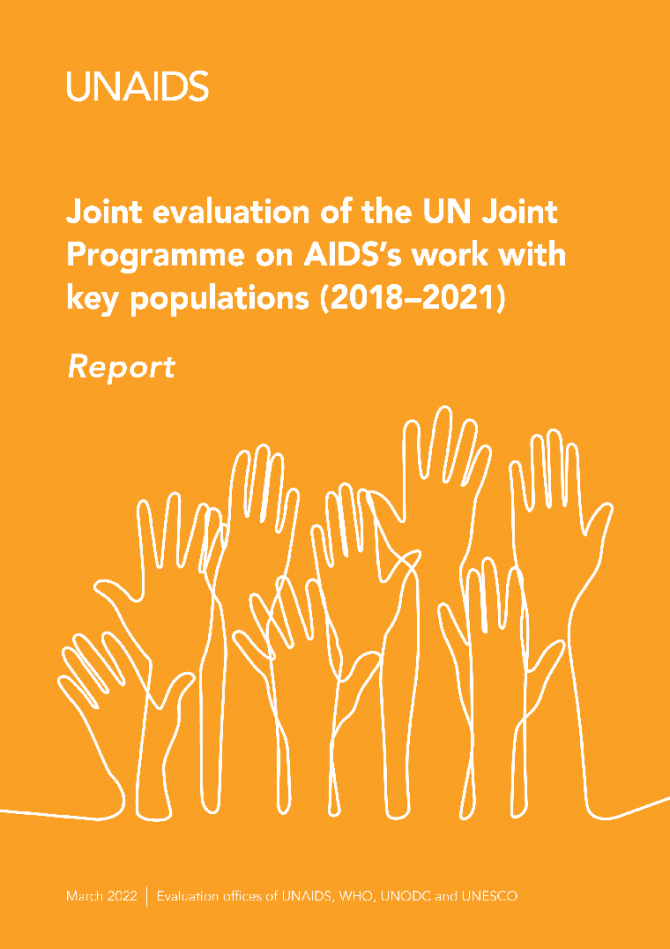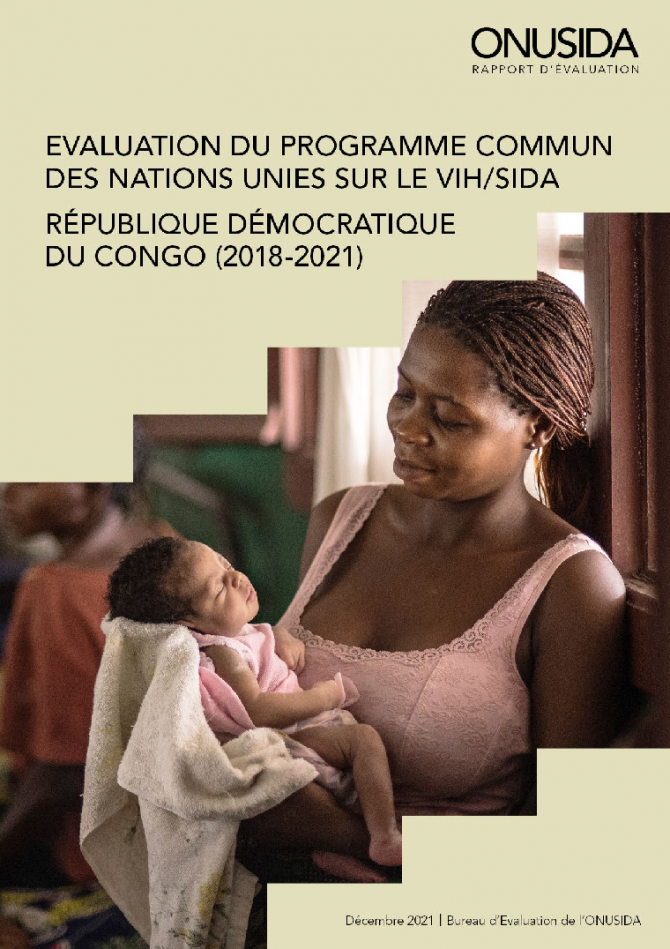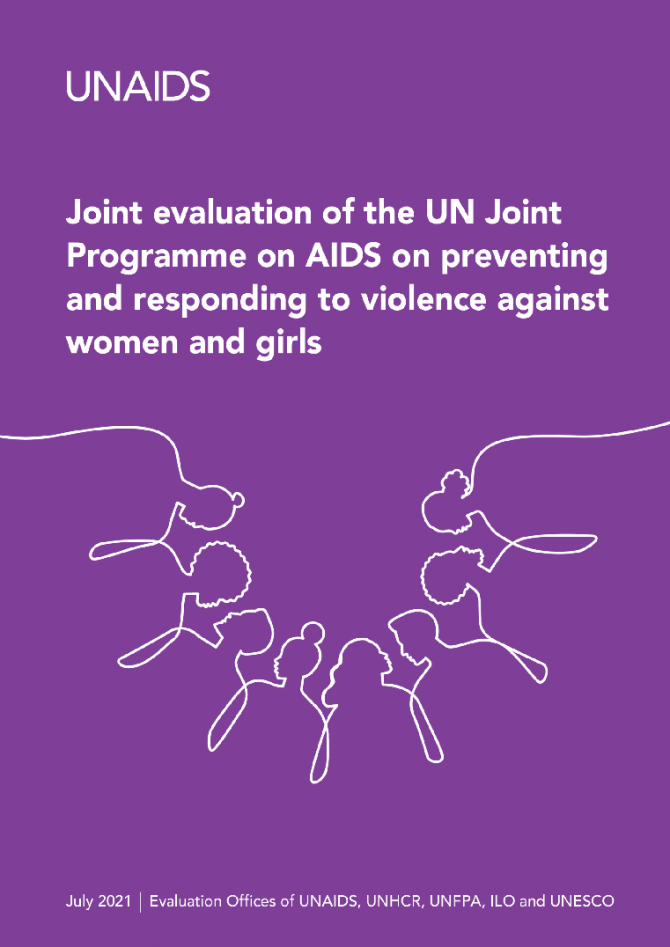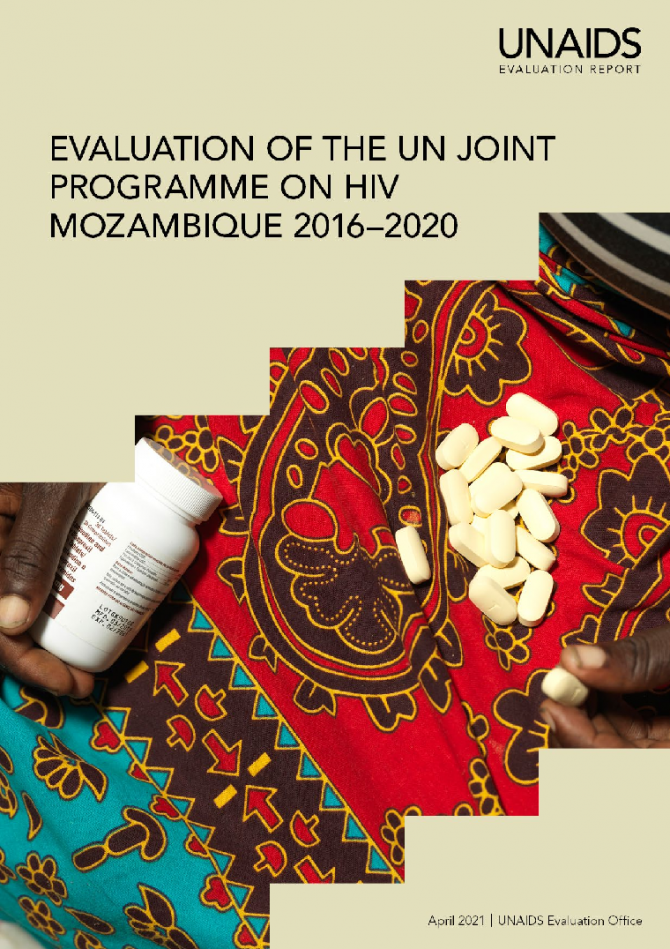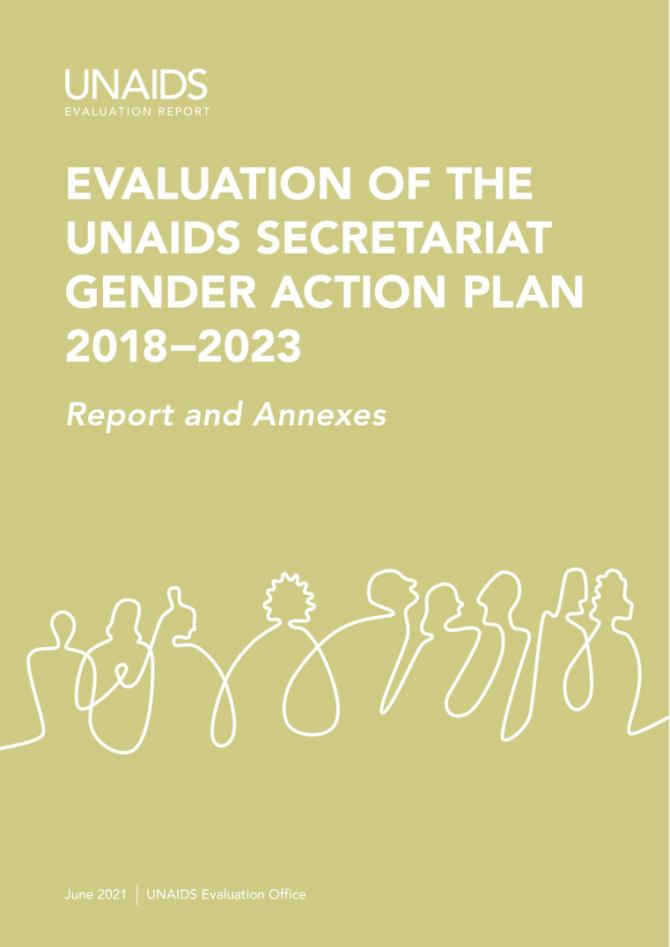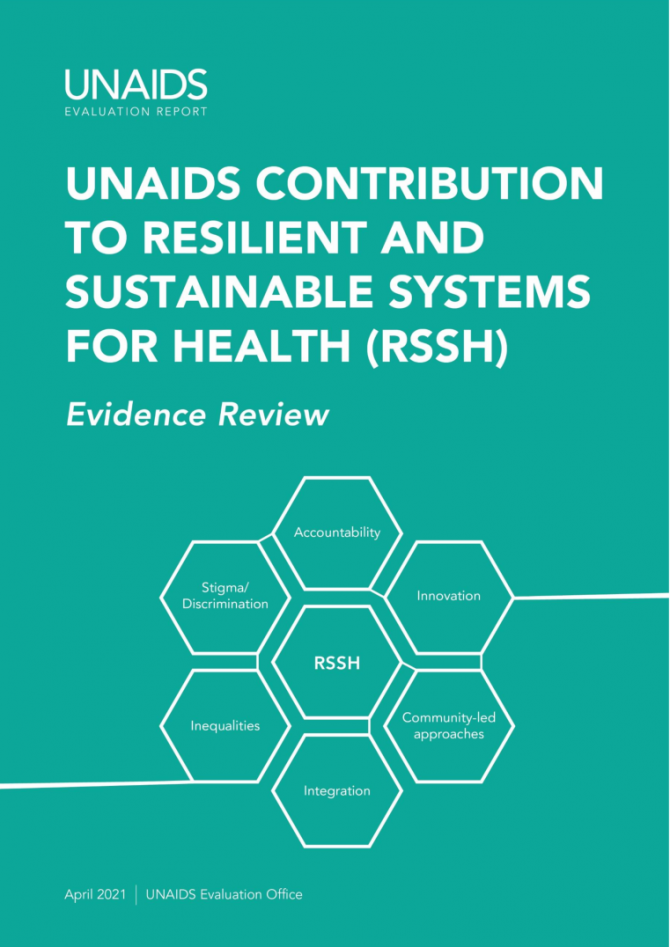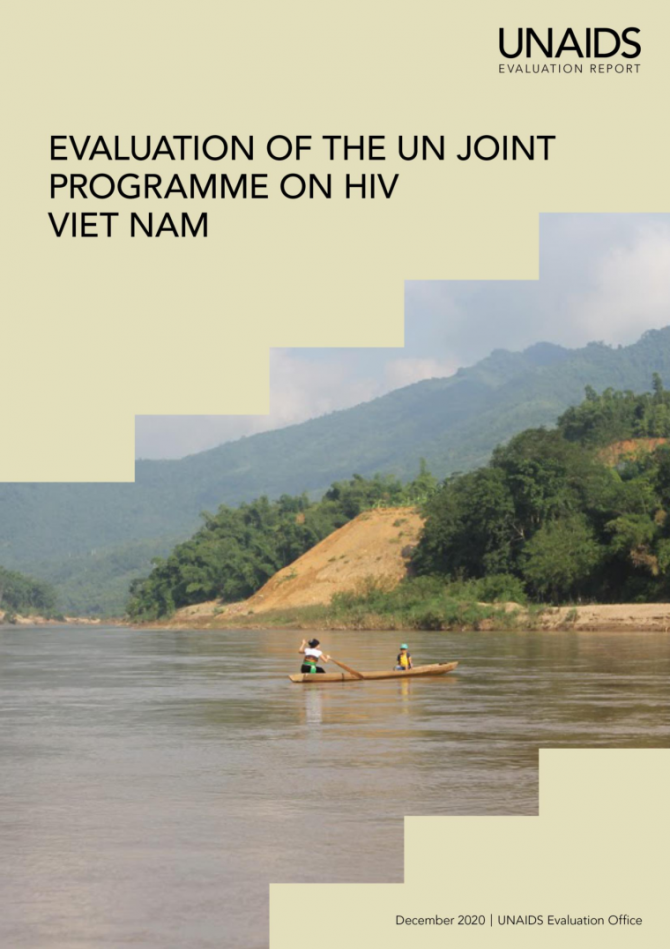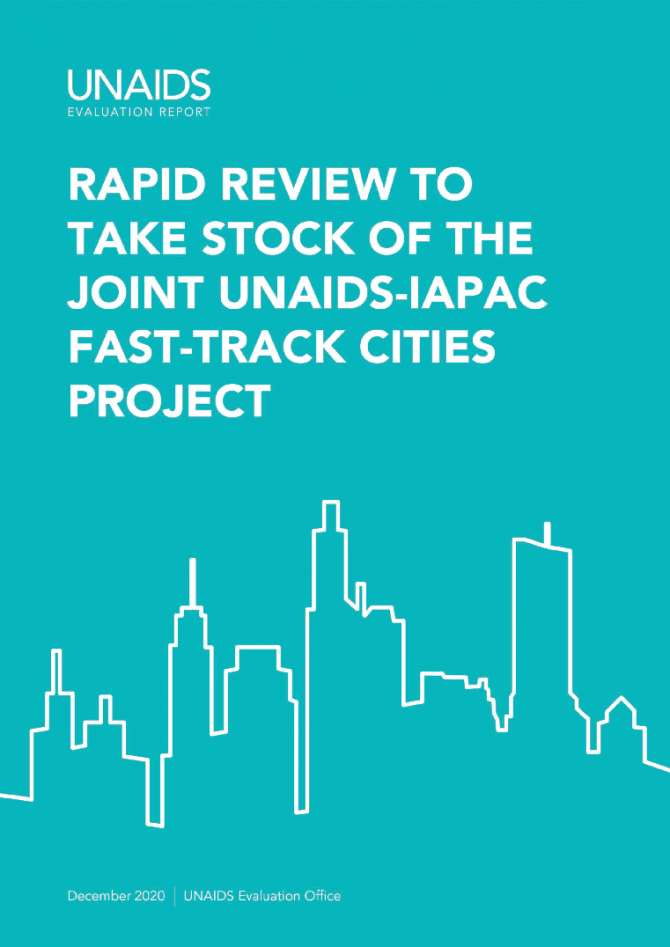Documents
Joint evaluation of the UN Joint Programme on AIDS's work with key populations (2018-2021)
05 April 2022
UNAIDS, WHO, UNODC and UNESCO Evaluation Offices have jointly managed an independent evaluation of the UN Joint Programme on AIDS work with key populations. The evaluation combined a global consultation and document review with six in-depth country case studies, engaging key populations in all stages of the evaluation. The Joint Programme is recognized for supporting key population responses. However, advocacy to defend the human rights needs to increase and programming needs prioritizing to address inequalities and pockets of high incidence. Inclusive planning processes are needed to enhance the relevance of Joint Programme activities, as well as a stronger monitoring and reporting system. To ensure financial sustainability, there is need for more investments for key populations as well as integration of HIV services and making UHC work for different key population groups. The evaluation helps understanding what support to community-led responses means in practice.
Related resources: Evaluation report – Vol I | Country case studies – Vol II | Evaluation brief | Presentation | Key messages | Management response
Documents
Evaluation of the UN Joint Programme on AIDS in the Democratic Republic of the Congo (2018-2021)
24 January 2022
The evaluation of the UN Joint Programme on AIDS in the Democratic Republic of the Congo covers the period 2018-2021. The evaluation approach takes into account the local/regional contexts and presents an overview of the achievements and challenges of the Joint Programme in the DRC. It highlights that the added value of the Joint Programme lies in its catalytic work, through strategic and technical support, and that UNAIDS plays a key role in mobilizing the UN joint team on AIDS. The evaluation finds that the Joint Programme has contributed to the integration of civil society networks into the HIV response. However, gaps exist. For instance, increased support is needed for a sustainable and meaningful engagement of the members of civil society organizations. The evaluation is expected to help the Joint Programme provide effective support to the HIV response, with a view of eliminating AIDS as a public health threat by 2030. Please access the report in French
Documents
Joint evaluation of the UN Joint Programme on AIDS on preventing and responding to violence against women and girls
17 November 2021
UNAIDS, UNESCO, UNFPA, UNHCR and ILO Evaluation Offices jointly managed an evaluation of the work of the Joint Programme on preventing and responding to violence against women and girls (VAWG) in all their diversity.
The evaluation assessed the Joint Programme’s role work on VAWG and the bi-directional nature of VAWG and HIV, where VAWG can be an indirect and direct factor for increased HIV risk, and violence can be an outcome of HIV status and disclosure. The evaluation combined global consultation and document review with nine country case studies, and fully engaged women living with HIV and national organisations addressing violence against women.
The evaluation found that the Joint Programme has to some extent been successful in supporting countries work collaboratively with women’s and other civil society networks in addressing gender equality, HIV and VAWG, however inadequate attention is paid to transformative approaches to address the structural and root causes of gender inequality, HIV and VAWG. The evaluation provides strategic and operational recommendations for the Joint Programme on how to best contribute to ending of the AIDS epidemic and VAWG.
Related resources: Executive summary | Annexes | Country case studies | Presentation | Management response
Documents
Evaluation of the UN Joint Programme on HIV in Mozambique
27 August 2021
The evaluation of the Joint Programme in Mozambique tries to respond to three overarching questions: is the UN Joint Programme on HIV in Mozambique doing the right things, in the right way, and achieving the right results? The evaluation assessess the contribution of the UN Joint Programme on HIV in relation to the 10 core commitments of the United Nations General Assembly 2016 Political Declaration on HIV and AIDS and the UNAIDS 90–90–90 targets. It captures the perspectives of the UNAIDS Secretariat and Cosponsors, the Government of Mozambique, civil society and other key national and international partners. The evaluation highlights the importance of continued and intensified support from the UN to the national HIV response and is expected to inform current and future AIDS programmes and activities under the new United Nations Sustainable Development Cooperation Framework in the country.
Documents
Evaluation of the UNAIDS Secretariat Gender Action Plan
27 August 2021
Gender equality is at the heart of the 2030 Agenda for Sustainable Development, as a goal and as a critical enabler to progress across the entire agenda. In 2018, building on previous efforts and as part of the UN Secretary-General System-wide Strategy on Gender Parity, UNAIDS developed a Gender Action Plan (GAP) 2018-2023, to achieve gender parity among its workforce, embed gender across learning and performance management and empower staff. The evaluation of the GAP takes stock of what has been achieved and where progress is lacking. It explores relevant organizational developments and options to achieve and update the GAP targets. The main achievement to date has been to move the UNAIDS workplace towards reaching parity among women and men. The next step is to go deeper and to develop tailored actions, targets, and commitments to support that change. The findings and recommendations of the evaluation are expected to advance gender equality and a broader culture transformation in UNAIDS. Related document: Management response
Documents
UNAIDS contribution to resilient and sustainable systems for health (RSSH)
17 June 2021
Existing health services often fail to address the HIV-related needs of people who need them most, while dedicated HIV services do not always meet the broader health needs of the most marginalized people. Resilient and sustainable systems for health (RSSH) are crucial for people to access quality health and HIV services, including through community systems. This review summarizes evidence on how the HIV response has contributed to RSSH, with focus on four countries: the Dominican Republic, Ethiopia, Ghana and Kyrgyzstan; it summarizes evidence on the contribution of UNAIDS (principally the Secretariat) in key areas of RSSH; and it identifies missed opportunities at country level, where UNAIDS can play a role in the future. Related documents: Annex - Country case studies
Documents
Evaluation of the UN Joint Programme on HIV in Viet Nam
04 March 2021
The evaluation of the UN Joint Programme in Viet Nam was designed around three main questions: Is the Joint Programme on HIV in Viet Nam focusing on the ‘right things’? Is the Joint Programme doing these things in the ‘right ways’? To what extent is the Joint Programme delivering the ‘right results’? The evaluation draws on lessons learned from implementation in the period January 2016 to August 2020 and provides recommendations to the UNAIDS Secretariat and Cosponsors for forward and strategic planning purposes. The evaluation provides a compelling rationale for further UN investments to support the national HIV response in Viet Nam and is expected to be especially useful in the context of the new Viet Nam National Strategy to End AIDS by 2030 and the new UN Sustainable Development Cooperation Framework (UNSDCF for 2022-2026).
Documents
Rapid review to take stock of the joint UNAIDS-IAPAC Fast-Track Cities project
04 March 2021
The Joint UNAIDS-IAPAC Fast-Track Cities Project, launched in 2018, is a collaboration between UNAIDS and the International Association of Providers of HIV Care (IAPAC), supported by the US Government. It aims to provide essential technical support to 15 priority high-burden cities to accelerate their HIV responses towards achieving key Fast-Track targets and delivering on the commitments of the Paris Declaration on Fast-Track Cities Ending the AIDS Epidemic. This rapid review takes stock of progress over the first phase of the programme (2018-2020) in all the 15 high-burden cities. The review provides useful feedback to UNAIDS, IAPAC and municipalities for improving collaboration and achievement of results, informing the next planning phase, and enabling continued progress, also considering effects of the concurrent COVID-19 pandemic.

